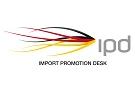The Import Promotion Desk (IPD) together with the Deutsche Gesellschaft für Internationale Zusammenarbeit GmbH (GIZ) presented organic products from 15 developing and emerging countries at the Biofach trade fair in Nuremberg this year, with a focus on countries such as Sri Lanka, Indonesia and Ukraine. On site, we talked to Linda Mense (Regional Expert IPD HUB Sri Lanka), Judith Emmerling (IPD Head of Sourcing & Markets) and María Paula Goméz S. (IPD Expert Sourcing & Markets) about the specifics of, but also challenges for the respective organic products.
Linda Mense, Judith Emmerling and María Paula Goméz S (left to right)
Sri Lanka 100 percent organic
While processed products such as coconut flakes, oils, and chips continue to be in high demand, the situation for fresh produce is difficult due in part to extremely high air freight prices, Mense knows. "In all Asian countries, logistics is in a problematic situation due to high prices. However, we are confident. The prospects for fresh mangoes from Sri Lanka look very good. For example, together with the Sri Lankan company Ellawalla Horticulture, which we are presenting at the show, we are continuing to work on opening up the market to Europe for innovative mango varieties." Furthermore, there is also a lot of interest in Europe for processed jackfruit, pineapple and similar products, she said.
Mense also explains: "There has been a lot of effort in Sri Lanka to start a campaign to become a 100 percent organic growing country. Accordingly, you can find a wide organic structure and many organic certified exporters in Sri Lanka." Biofach also saw the official granting of the European Union's Protected Certificate of Origin Ceylon Cinnamon at the Sri Lankan country stand. This country stand was organized jointly with local partner EDB (Sri Lanka Export Development Board), GIZ Sri Lanka and IPD.
Great interest in the EU market from Latin America
As an expert on the Latin American region, Goméz is also aware of how exporters from countries like Ecuador view the EU market. "Latin American companies usually try to market their goods in the U.S. - due to geographic proximity and the familiarity of Latin American products. Europe and Japan are markets where it's hard to find entry."
However, he said there is a growing interest in companies to obtain certain certificates to enter the EU market. "Especially in the organic sector, it pays off for companies in the end, even if it comes with certain challenges," Goméz said.
"The European market is still very interesting for Asian and Latin American producers. Germany, after all, is one of the largest buyers of organic products in the world," Goméz says. "The increased demand for organic products in Germany itself can be seen, among other things, in the many, new organic stores and organic supermarkets that are opening every year." But many retailers are also now offering lower-priced organic products, she said.
70 of 400 companies certified organic
Goméz points out that the IPD has access to a pool of nearly 400 companies that produce both conventional and organic products, of which 70 companies produce completely organic. Mense emphasizes that there are major differences depending on the country of origin: for example, most Sri Lankan companies in the IPD program are certified organic, while the proportion of fresh products from Peru supported by the IPD is also very large, and in Ethiopia, in turn, only a few companies are certified organic.
When there are several companies to choose from that meet the criteria for cooperation with the IPD, the IPD often chooses to cooperate with organic companies because they meet important criteria required in the EU market, Emmerling said. "But of course we also cooperate with companies that do conventional farming. But I have the impression that in many countries there is a growing awareness of the potential of organic products." Such as in Egypt, where Emmerling himself worked for several years.
IPD Program and matchmaking processes
"Carefully selected companies are accepted into the IPD program. Companies that are suitable for export but do not yet meet all requirements are intensively prepared by IPD. For this purpose, we offer e-learnings, consultations by IPD Expert:ins and experts for the import and export as well as for the EU market, which should support the companies in export-relevant topics, ultimately making them matchmaking-ready," says Emmerling.
"To be accepted into the IPD program, companies are screened according to strict criteria. We take into account product quality, export capability and capacity, and compliance with international standards and certifications. Transparent supply chains without intermediaries are particularly important to us, so that we can meet the due diligence requirements of the Supply Chain Act (LkSG)," says Goméz.
"Once they are in the program, we usually support them for three years to gain a foothold in the European market and establish contacts with importers. We closely monitor which areas of the business have done well and which could possibly be improved. We accompany the producers on the so-called last mile. After that, the companies have usually made the leap to Europe, established sustainable business relationships and are selling their products into the EU market."
For more information:
Judith Emmerling
María Paula Goméz S. Linda Mense
Linda Mense
Import Promotion Desk
c/o sequa gGmbH
Alexanderstr. 10
D-53111 Bonn
Tel: +49 (0) 228 909 0081 0
Fax: +49 (0) 228 926 37 989
E-Mail: info@importpromotiondesk.de
Web: https://www.importpromotiondesk.de
